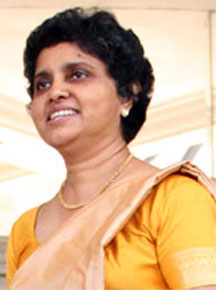COLOMBO, (Reuters) – Sri Lanka’s appeal court yesterday blocked parliament from voting to impeach the country’s chief justice, the latest step in the case that risks a destabilising clash be-tween President Mahinda Rajapaksa’s government and the judiciary.
Shirani Banda-ranayake was found guilty by a parliamentary panel earlier this month of financial irregularities and a failure to declare assets, after the Supreme Court head and opposition parties withdrew from the proceedings citing unfair process.
The United States, the United Nations and the Commonwealth have raised concerns about the process and called on Rajapaksa to ensure the independence of the island nation’s judiciary.

Parliament was to vote next month to impeach Bandaranayake, Sri Lanka’s first woman chief justice. Rajapaksa can use his more than two-thirds majority in the 225-member legislature to remove her from her post.
The appeal court ruling stops parliament voting on her impeachment while it decides whether her appeal against the charges by the parliamentary panel is justified.
“The court has determined no further action should be taken,” said a lawyer who asked not to be named.
Earlier this month, Sri Lankan lawyers boycotted courts, crippling the judicial system in protest at the impeachment proceedings. Yesterday, hundreds of lawyers demonstrated near the Supreme Court against the move and attacks on the judiciary after shootings outside the houses of two leading lawyers this week.
Rajapaksa has ordered an investigation into the attacks.
SUMMONS
In her 26-page application to the appeal court, Bandaranayake said the parliamentary committee had not allowed her enough time to respond to the charges, and had failed to set out its procedures or allow her to cross-examine witnesses.
The accusations against her arose after she ruled against a bill proposing an 80-billion rupee ($614 million) development budget which she said had to be approved by nine provincial councils.
The ruling angered some of Rajapaksa’s backers, who accused the judiciary of overstepping its authority. Bandaranayake’s supporters complained of political interference.
Parliament speaker Chamal Rajapaksa, the president’s brother appointed the parliamentary panel with seven of its 11 members from the ruling party to investigate 14 charges against Bandaranayake. She was found guilty of three of the first five charges.
The appeal court said yesterday it would summon Chamal Rajapaksa, parliament’s secretary general and the 11 members of the parliamentary panel to a hearing next month.
Last month, the speaker rebuffed a Supreme Court summons on impeachment. Chandima Weerakkody, the deputy speaker said the speaker and the panel members were not bound by the order.
“This is similar to the prior situation. So I feel that the earlier decision of the speaker will stand,” he told Reuters.
